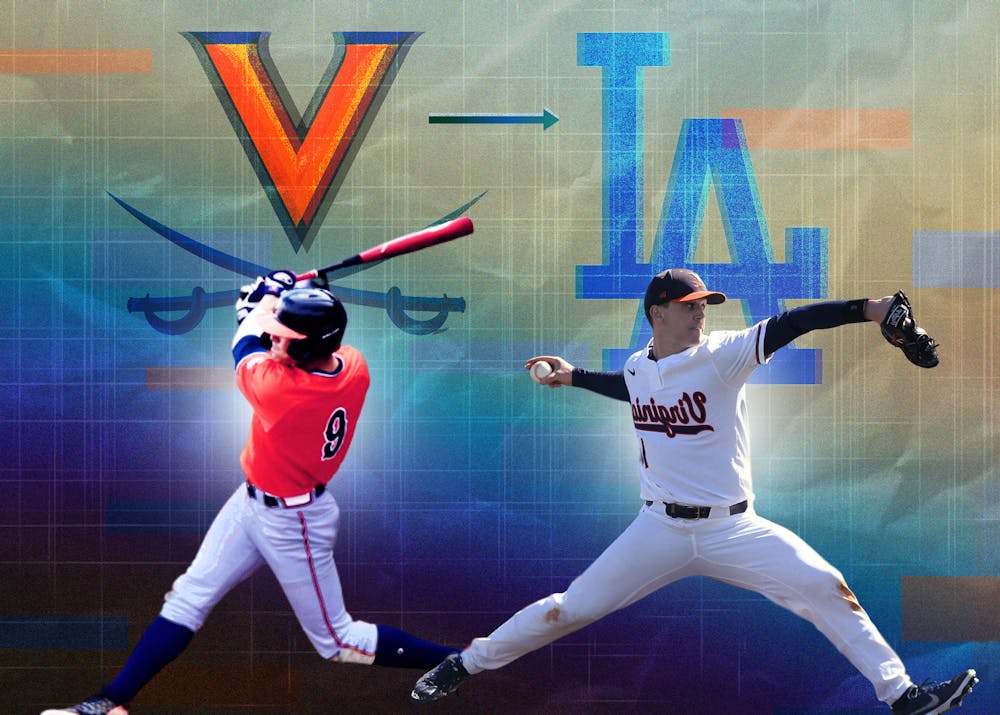July 18, 2022 was a special day for Virginia pitcher Brandon Neeck. He was selected in the ninth round of the MLB Draft by the Los Angeles Dodgers.
July 19, 2022 was another good day for the Virginia baseball community. One of Neeck’s closest friends, outfielder Chris Newell, was also drafted, and he went to the same organization as Neeck.
Their dreams of playing professional baseball were suddenly very real — and they were going to chase those dreams together. Since 2022, they have done just that. In fact, they are roommates.
“I tell myself a lot, how fortunate we are to be playing with each other,” Newell said in an interview with The Cavalier Daily.
The duo is fortunate to not just play with each other, but to play for an organization that won the World Series in 2024 — and, also, features other Virginia baseball alumni. Since 2020, no organization has drafted more former Cavaliers than Los Angeles.
In addition to Newell and Neeck, the Dodgers picked Virginia’s career home run leader, Jake Gelof, in 2023. Then, in the 2025 MLB Draft, Los Angeles drafted a pair of Virginia pitchers — junior Jack O’Connor and graduate student Matt Lanzendorfer.
Embodying the spirit of Cavalier baseball, their time in Charlottesville set them up for success in professional baseball.
When battling to advance up the multiple levels of Minor League Baseball, Newell and Neeck say they have an advantage — the classic Virginia baseball grit factor. The hallmarks of any Cavalier baseball player are a limitless motor, sound fundamentals and a team-first mindset.
“I think going to U.Va. and playing baseball there will have you as prepared as you can be for pro ball,” Neeck said.
Those traits are so valued by MLB organizations, that the 2025 MLB Draft marked the 18th time in the past 22 years that four or more Cavaliers were drafted — O’Connor and Lanzendorfer, plus junior infielder Henry Godbout, junior utilityman Chris Arroyo, senior pitcher Jay Woolfolk, junior pitcher Ryan Osinski and junior infielder Luke Hanson.
That cohort — plus many others — have consistently kept Virginia among the nation’s top programs year in and year out, with the program having been to the College World Series three times since 2021.
“Ultimately [Virginia’s coaches] prepare you and teach you how to win, which obviously is the most important thing at the end of the day,” Newell said. “So I think learning how to win is kind of what really prepared me to start my professional career, for sure.”
But there is just one problem. There are about 5,550 players in Minor League Baseball, and all of them have one goal — reach the major leagues. And across all 30 Major League teams, there are only 780 roster spots.
In Newell’s case, he is making it easy for Dodgers brass to take notice of him. After ascending through Single-A Rancho in Arizona and High-A Great Lakes in Michigan, he and Neeck are currently at the Double-A level with the Dodgers’ affiliate, the Tulsa Drillers.
In short, Newell has been on a tear. He was named player of the week twice in the Double-A Texas League and is currently rocking a 32-game on-base streak that has run from July 1 to Aug. 21.
However, one thing no college can prepare its players for, is the day-to-day grind of the minor leagues. Because organizations want their developing players to have lots of playing time, the schedule runs from late March to early October. In the upper levels of MiLB, there can be six games a week. Compared to the college season that will usually consist of four games a week — and only runs from February to June — MiLB can be much more taxing physically.
That toll feels exponentially worse when factoring in that the average Double-A player only earns about $30,000 a year. Minor leaguers recently began receiving free housing and two meals a day from their respective organizations, but still, the compensation is a far cry from the lucrative multi-million dollar deals in the Majors.
And it hurts even more considering that it is very difficult to see loved ones during the MiLB season. According to Newell, not being able to see family and friends is the hardest part of chasing his dream. He has a younger sister and is not able to see her nearly as often as he would like to.
“Not being able to be around her and be there for her growing up, and just being with my family, honestly, is one of the hardest things that you still navigate now, and you always will have to navigate throughout your career,” Newell said.
It can be easy to lose sight of the ultimate goal when schlepping through the ups and downs of the Minors. But on those days of feeling a bit lost, Newell and Neeck return back to that Virginia baseball mindset.
“What I've found, what's helped me a lot, is just really trying to be in the moment and enjoy each day for what it is, and just go out and compete and try and win each day,” Newell said.
As for the Cavalier program? Well, that has experienced a rare changing of the guard three years after Newell and Neeck were drafted. Now under the leadership of Coach Chris Pollard after Brian O’Connor departed for Mississippi State in June, Virginia has an entirely new coaching staff.
What has not changed, however, is the heart of the program. Cavalier baseball sticks to its core values. Neeck said so himself, and he believes that Virginia still sets its players up for professional success.
“Although Coach O'Connor is now gone, that program always expects a lot of its players and expects a full commitment, which is what will be required in pro ball,” Neeck said. “So you'll be as prepared as anybody if you're able to get drafted or signed.”







